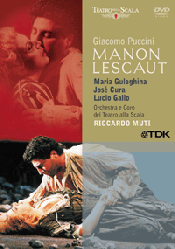The opera had a somewhat tortured genesis, with five librettists eventually having a hand in it, including composer Ruggiero Leoncavallo and Puccini’s team-of-the-future Giuseppe Giacosa and Luigi Illica. Perhaps there are hints of this in the final product which stand between Manon Lescaut and warhorse status. Yet watching the opera from beginning to end in this handsome production from La Scala with its pair of charismatic leads, I couldn’t help but see in this opera the very same Puccini that we know and love.
There are departures. Some feel that the final act is dramatically weak by Puccinian standards. The composer nakedly stakes out “modern” territory by borrowing the musical language of Tristan und Isolde for his Intermezzo, while some of the big choral moments in the first act have a distinctly old-fashioned feel about them. And even though it is no longer than several of the other Puccini operas, Manon Lescaut has a bit of a sprawling feel to it which separates it from the laser-like focus Puccini exhibits in later titles.
Yet when the muse strikes, Puccini is as potent as anywhere. Des Grieux’s wooing of the lovely Manon in act one, the lover’s exchanges in act two, the gorgeous Intermezzo, the stunning parade of fallen women in act three, and the pair’s cries of desperation in the final act are all as affecting as any such passages in the Puccini canon.
But maybe the biggest departure is in the title character herself. Mimi, Tosca, Butterfly, Minnie, Angelica, and Liu are all easy to love. They themselves love with selfless devotion. They are simple and good. They don’t deserve the cruel hand which fate deals them. Not so with Manon. Our heroine is immature, selfish, and unfaithful. Even after being given a second chance by the heartbroken Des Grieux, when they desperately need to flee from her wealthy, elderly lover’s estate, she takes extra time to gather up jewelry and various treasures with which she cannot bear to part.
But for me, all these faults in some ways makes Manon all the more compelling, because they make her seem real. I love Cio-cio-san, but how many fifteen year-olds do you know with that amazing level of maturity? The teenaged girls I know are a lot closer to Manon!
This particular representation of the opera has just about everything going for it. The production, filmed at La Scala in 1998, is a lavish period staging with costumes as beautiful as museum pieces, and sets which bring the story vividly to life.
But even more important are the leads. One could hardly imagine a more handsome Des Grieux than Jose Cura or a more beautiful Manon that Maria Guleghina. They are picture-book leads. Neither gives a cookie-cutter performance, and these are not cookie-cutter voices. Cura’s tenor sounds more like a baritone with (great) high notes, and his vocal mannerisms—most which don’t bother me—are very much in evidence. Guleghina is shown at her best here. She is a singer with a huge voice, but one which, at times, can seem to spin out of control. Here she keeps it tamed for the most part. It is always a voice which sounded mature in comparison with her youthful appearance, with a fairly wide vibrato, especially in loud passages. Maybe that angelic face here distracted me. But if it did, so be it! Marco Berti, now a regular lead at the Metropolitan Opera, sings the small role of Edmondo in the first act. Lescaut is sung by Lucio Gallo, and Geronte is well sung and acted by Luigi Roni. Riccardo Muti leads the orchestra in a very fine reading of the score.
The DVD’s presentation is stylish and useful. The menu is very attractive, with a montage of scenes from the opera being acted out accompanied by music from the Intermezzo. One may select subtitles in English, German, French, Spanish, and Italian, and may select a particular act, or go directly to specific scenes within that act which are all labeled with titles from the Italian text.
I have no doubt that when Puccini sat down at his desk to write Manon Lescaut and pictured the scenes of the opera, he must have imagined them very much like this.
Eric D. Anderson
